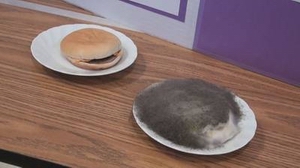 Earlier this week, ksl.com's story about a 14-year-old McDonald's cheeseburger in St. George went viral. David Whipple bought the burger in Logan in 1999 and it looks just about the same today, after spending much of that time in a coat pocket. Turns out, a young scientist in St. George was already conducting an experiment of her own.
Earlier this week, ksl.com's story about a 14-year-old McDonald's cheeseburger in St. George went viral. David Whipple bought the burger in Logan in 1999 and it looks just about the same today, after spending much of that time in a coat pocket. Turns out, a young scientist in St. George was already conducting an experiment of her own.Three months ago Jocelyn Hummel, a fifth grader in Washington, Utah, read an article in a national publication that stated a McDonald's cheeseburger wouldn't rot. She was skeptical and decided to slice through the sizzle and get down to the science.
"It didn't make much sense to me, so I decided to do my science project on it," Hummel said.
When she saw ksl.com's story on this cheeseburger that simply dried up after 14 years, she told said we needed to see her work.
"In order to mold and decay, you need moisture," she said.
That was her hypothesis. So, she put one burger on a plate in the pantry. And this is how her experiment differs with previous studies on aging fast food burgers.
"They each only got one, and just let it sit out," Hummel said. "I got two to see the differences between them."
She put the second burger next to a moist sponge in a ventilated container.
"Day eight is when it first started to mold," she said.
In an official statement, McDonald's says that all of its patties are cooked and prepared with salt and pepper, nothing else. No preservatives, no fillers. Just as Hummel discovered, they point out that without moisture, mold and bacteria just won't grow.
"You can feel no moisture at all," Hummel said. "It's completely hard."
The open-air burger, after 67 days, has little change. The cheeseburger next to the sponge looks more like a toupee on a plate.
Jocelyn took first prize in the science fair and discovered her hypothesis was correct.
"It feels like I'm smarter than the adults," she said.
Referring to the 14-year-old burger, McDonald's says "any food purchased from a restaurant or grocery store or prepared at home that lacks moisture would also dehydrate and see similar results if left in the same environment."
Visit the source article







